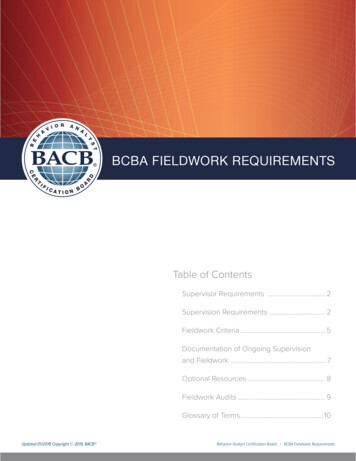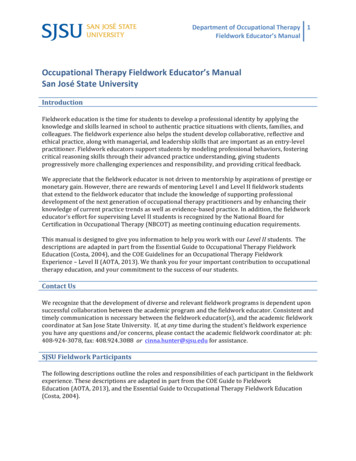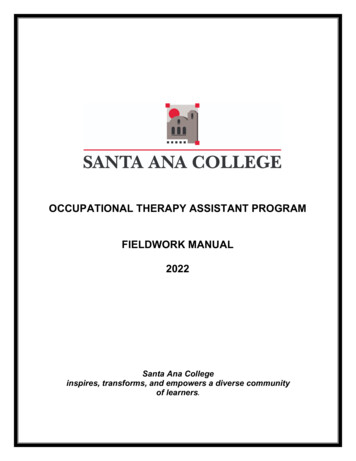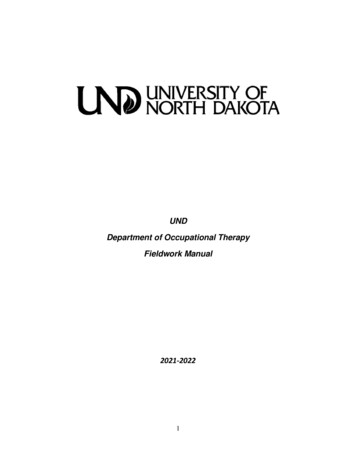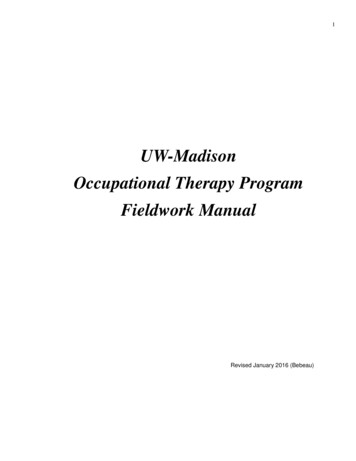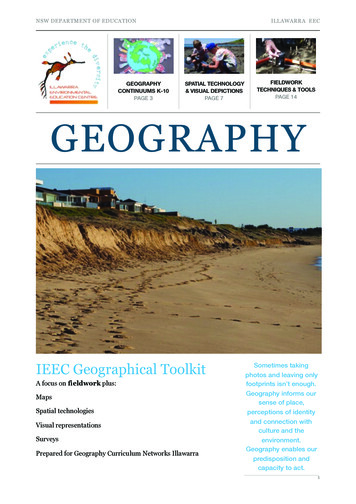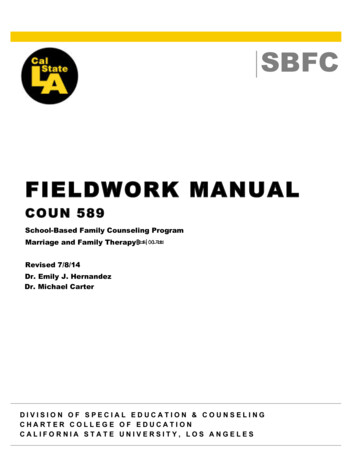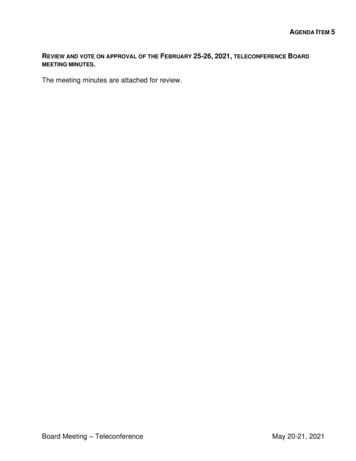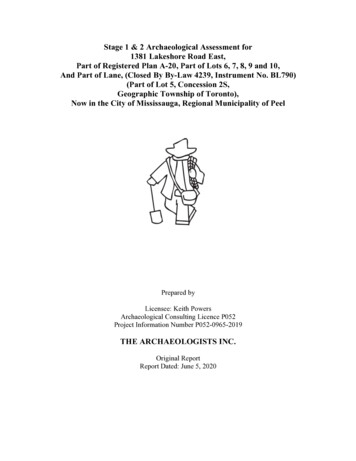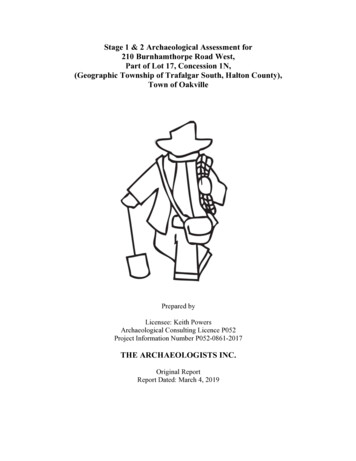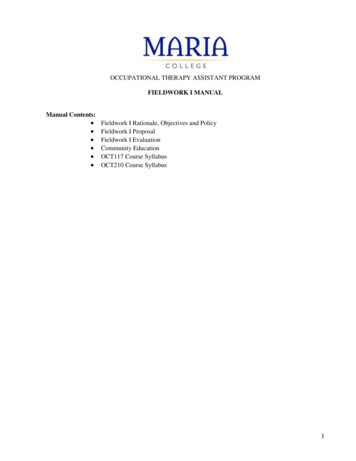
Transcription
OCCUPATIONAL THERAPY ASSISTANT PROGRAMFIELDWORK I MANUALManual Contents: Fieldwork I Rationale, Objectives and PolicyFieldwork I ProposalFieldwork I EvaluationCommunity EducationOCT117 Course SyllabusOCT210 Course Syllabus1
OCCUPATIONAL THERAPY ASSISTANT PROGRAMOCT117 Fieldwork I – Service LearningRationale, Objectives and PolicyI. RATIONALE:The American Occupational Therapy Association’s (AOTA) Accreditation Council for Occupational TherapyEducation (ACOTE) Standards describe the objective of Level I Fieldwork "to introduce students to thefieldwork experience, and develop a basic comfort level with an understanding of the needs of clients." LevelI Fieldwork is not intended to develop independent performance, but to "include experiences designed toenrich didactic coursework through directed observation and participation in selected aspects of theoccupational therapy process."See more at: velI.aspx#sthash.ar11FLb9.dpufServices may be provided to a variety of populations through a variety of settings. Experiences may includethose directly related to occupational therapy, as well as other situations to enhance an understanding of thedevelopmental stages, tasks, and roles of individuals throughout the life span. Day care centers, schools,neighborhood centers, hospice, homeless shelters, community mental health centers, and therapeutic activityor work centers are among the many possible sites. Level I Fieldwork may also include advocacy, research,services management and administrative experiences in therapeutic settings, community agencies, orenvironmental analysis experiences. Populations may include disabled or well populations; age-specific ordiagnosis specific clients.See more at: velI.aspx#sthash.ar11FLb9.dpufQualified personnel for supervision of Level I Fieldwork may include, but are not limited to, academic orfieldwork educators, occupational therapy practitioners, psychologists, physician assistants, teachers, socialworkers, nurses, physical therapists, social workers, activity directors, etc. The supervisor must beknowledgeable about occupational therapy and cognizant of the goals and objectives of the Level I Fieldworkexperience.See more at: velI.aspx#sthash.ar11FLb9.dpufThe Level I Fieldwork experience is intended to present opportunities for new learning and help the studentintegrate and apply his or her previously acquired knowledge. The Fieldwork I experience also provides reallife situations for reflective learning in subsequent coursework.II. COURSE OBJECTIVES:Through the Level I Fieldwork experience the student will be able to:1.Practice observation, interviewing, and documentation skills.2.Utilize interpersonal communication skills to develop professional relationships.3.Participate, as appropriate to level of education, in the delivery of client services.4.Gain a dynamic understanding of the concepts presented in in The Occupational TherapyPractice Framework: Domain and Process. (AOTA 2014).5.Discuss the roles of occupational therapy and other allied health personnel.6.Become aware of the community facility’s mission and organizational structure.7.Further develop his/her personal and professional goals.2
III. OCT117 FIELDWORK I POLICY:Students are eligible to complete OCT117 Fieldwork I – Service Learning during the second semester of OTAcoursework. Students will participate in the process of selecting the site for this assignment; final decision will be madeby the Academic Fieldwork Coordinator (AFWC) based on student interests, learning needs and site availability.Satisfactory Completion of Level I FieldworkStudents must complete a minimum of 40 hours of service learning to receive credit for fieldwork I. Planningtime will be taken into consideration. A student who completes OCT117 Fieldwork I satisfactorily hasdemonstrated an understanding of occupational therapy’s philosophy, theory, and processes. This studentcompleted all assignments in a timely manner and demonstrated professional behaviors and effectiveinterpersonal communication skills earning a letter grade of “C ”, or higher. This student is then eligible tocontinue with the OTA Program coursework sequence.Unsatisfactory Completion of Level I FieldworkAn unsatisfactory grade may result from any or all of the following: absences, tardiness, incomplete or poorlycompleted assignments, and/or failure to demonstrate and apply a basic understanding of occupational therapyphilosophy, theory, and skills. A student who continuously disregards client safety and/or demonstratesunethical and unprofessional behavior will most likely be dismissed prior to the completion of the Fieldworkassignment. Early dismissal for any of these reasons will result in a failing grade.Dismissal from a community placement must be communicated to the Academic Fieldwork Coordinator in atimely manner. Dismissal from Level I Fieldwork may be grounds for immediate dismissal from the OTAprogram. Students scoring below the minimum required grade may be allowed to repeat OCT117 FieldworkI only once to obtain a satisfactory grade.The Academic Fieldwork Coordinator will work with the student to develop a learning contract focused onremediation of the behaviors that lead to the failure or dismissal from the original Level I Fieldwork. Followingsuccessful completion of the identified goals, a repeat Fieldwork for the student will be scheduled at the discretion ofthe AFWC. The necessity to repeat OCT117 may delay continuation in the OTA program sequence andeligibility for graduation. Failure to achieve a satisfactory grade in Level I Fieldwork during a second placementwill result in dismissal from the OTA program.See current Maria College Catalog and OTA Program HandbookACOTE educational standards available at: tion.aspxRev. 3/153
OCT117: Fieldwork I Service Learning ProposalFieldwork Facility Name and Location:Fieldwork Supervisor Contact Information (name, title and e-mail/phone):Fieldwork Description:Student Participants:Requests for equipment, assistance, materials from Maria College:4
OCCUPATIONAL THERAPY ASSISTANT PROGRAMLevel I Fieldwork Evaluation InstrumentInstructions:KEY:Place the number (1-4) that best reflects this student’sbehavior as observed and/or demonstrated during theFieldwork experience. Use the space provided for each of thefollowing Performance Statements. The student should beevaluated on his/her demonstrated behavior/performanceduring this placement and without comparison to peers.Performance Statements:Rating:4 100% - 90%Excellent Performance3 89% - 75%Average Performance2 74% - 65%Needs Improvement1 64% - 0%UnsatisfactoryComments:Follows facility rules, policies, and procedures.Follows instructions from supervisor and staff.Responds with positive attitude to assignedstudent responsibilities.Demonstrates personal responsibility byshowing initiative.Establishes rapport with clients and staff.Demonstrates professional behaviors bypracticing positive verbal and non-verbalinterpersonal communication skills.Asks pertinent questions to gain knowledge.Observes safety precautions at all times.Respects and maintains confidentiality.Demonstrates flexibility by modifyingperformance after feedback is given.Signatures:Fieldwork Supervisor/Title/DateOTA StudentFieldwork Site:# of Hours :5
OCT 117: Fieldwork ICommunity Education AssignmentThis assignment places you in the role of the educator. You will work individually or in a group oftwo to four classmates to collaborate on this project. You will go out into the community andeducate a population about some aspect of OT, such as what OTAs do in everyday practice.Please do the following:1. Select your group members if you wish to work in a group (no more than 4 in a group).2. Determine the demographic you would like to educate. For example: older adults, parentsof children with special needs, potential college students looking into career options, etc.3. Determine the type of facility in which you would like implement your project.For example: a nursing home, rehabilitation center, a local Y or a classroom.4. Decide upon a topic of interest that you are comfortable presenting to your selectedpopulation. Material covered in your first year coursework is great for education!5. Submit your presentation topic and plans on the course Discussion Board for yourinstructor’s approval.6. Arrange for your visit. Be sure to obtain the approval of the facility manager.7. If you wish to document your visit with pictures or video to share with your instructor andclassmates, be sure to ask about the facility’s policy and get permission or clearance.8. Prior to your visit, make sure the facility can provide you with anything you may need forthe demonstration such as extra tables and chairs, AV equipment, etc.9. You will be required to have the facility representative fill out an evaluation form and signit. This form is to be returned to your instructor after completing your presentation.6
Community Group Project EvaluationMaria College OTA Program(518) 861 - 2549Name of Evaluator: Title:Facility:Population:Names of students in attendance:1.2.3.4.Please describe the topic presented, how it was presented and how the audience responded to thepresentation.Please comment on the students’ performance.Signature: Date:Thank you for supporting our program! Please feel free to call with any additional comments.7
Maria College700 New Scotland AvenueAlbany, New York 12208Course InformationOCT117 Fieldwork I – Service LearningOccupational Therapy Assistant Program1 Credit HourInstructor InformationMeghan DeNitto, BS, COTA/L, CH(518) 861- 2549malonem@mariacollege.eduCourse DescriptionA community-based fieldwork service learning experience in which students participate to help support theneeds of the facility or organization. Assignments are designed to help the students gain an awareness of theservices provided in the community setting, giving each student the opportunity to actively apply theknowledge and skills gained in the first year OTA courses as they work with clients and staff.Recommended ResourcesAmerican Occupational Therapy Association (AOTA web site) - www.aota.orgAJOT and OT Practice at www.aota.org or as hard copy in the Maria College library.Course RequirementsStudents are required to comply with the following course requirements:1. Professional BehaviorsOTA students are expected to demonstrate professionalism throughout their college career, in theclassroom and laboratory, as well as in the community while representing the Maria College OTAProgram. You are expected to abide by the AOTA Code of Ethics while out in field settings. AProfessional Behaviors Assessment Rubric including ten essential elements of professionalism willbe used to track student behaviors throughout their enrollment in the OTA program. Students areexpected to comply with all of the elements at all times and failure to do so can result in dismissalfrom the OTA program. Fieldwork Supervisors will use a modified version of the ProfessionalBehaviors Assessment as an evaluation of student participation in Fieldwork I.2. Timely Completion of AssignmentsYou are expected to complete all assignments by the required due dates. It is up to the discretion ofthe instructor on whether specific late assignments will be accepted. No late assignments will beaccepted ten days after the due date, or after the date of the final examination.3. Assignments and Assessments and Their EvaluationClass assignments and assessments will include and initial proposal for fieldwork site, writtenreports, presentations, and a reflective journal entry. Possible points for assignments andassessments will vary. Assignments and assessments will be evaluated for completeness, accuracy,content, form, knowledge of subject matter, application of knowledge, and the ability tocommunicate effectively.Course Learning OutcomesUpon completion of this course, the student should be able to:1.Practice observation, interviewing, and documentation skills.2.Utilize interpersonal communication skills to develop professional relationships.3.Participate, as appropriate to level of education, in the delivery of client services.4.Gain a dynamic understanding of the concepts present in in The Occupational TherapyPractice Framework: Domain and Process. (AOTA 2014).5.Discuss the roles of occupational therapy and other allied health personnel.6.Become aware of the community facility’s mission and organizational structure.7.Further develop his/her personal and professional goals.8
8.Promote Occupational Therapy by educating other professionals, service providers,consumers, and the public.Course Policies and Requirements**Please see Fieldwork I Rationale, Objectives and Policy posted within your Blackboard course.Student Preparation: It is expected that the student will draw on a broad scope of resources as they engagein and participate in this community-based course and related written assignments. Students areencouraged to use their knowledge acquired during the first two semesters of the OTA program,handouts, lectures, textbooks, peers and other professionals. Students are expected to use the unitobjectives on this outline and the course assignments to direct their studies. Students areencouraged to engage their Fieldwork Supervisor and classmates in discussions that will generateinformation and understanding necessary for completion of written assignments.Course Delivery ProcessThe majority of this course will be completed by participating in the Level I Fieldwork and supplemented byusing Blackboard to participate in discussions of specific topics, submission of reflective journals andwritten assignments. Learning materials, readings, and assignments will be posted in Blackboard.Online discussion forums will be made available for students discussions with the instructor and peers.This is primarily a self-directed course. You are expected to incorporate Fieldwork experiences into the writtenresponses given for the assigned topics. In addition to the observations of and discussions with other professionalswhile on Fieldwork, you are expected to conduct web searches to obtain pertinent information and pursue additionalreading in order to advance your understanding about current issues influencing your Fieldwork site.Grading Criteria/Policy1. Fieldwork Proposal2. Community Education Project3. Service Learning Participation4. Reflective Journal5. Assessment by Supervisor10%10%50%10%20%100%Grades are issued at midterm and at the end of the semester using a letter system and quality point values:Numerical averageGradeQuality Points92.6 - 100(93 - 100)A(4.0)89.6 - 92.5(90 – 92)A(3.7)86.6 - 89.5(87 – 89)B (3.3)82.6 - 86.5(83 – 86)B(3.0)79.6 - 82.5(80 – 82)B(2.7)76.6 - 79.5(77 – 79)C (2.3)72.6 - 76.5(73 – 76)C(2.0)69.6 - 72.5(70 – 72)C(1.7)66.6 - 69.5(67 – 69)D (1.3)62.6 - 66.5(63 – 66)D(1.0)59.6 - 62.5(60 – 62)D(0.7)59.5 (59) and lowerF(0.0)Note: A minimum grade of C is required to continue in the OTA program.9
Maria College700 New Scotland AvenueAlbany, New York 12208Course InformationOCT 210 Fieldwork I-PsychosocialOccupational Therapy Assistant Program1 Credit HourInstructor InformationMeghan DeNitto, BS, COTA/L, CH(518) 861- 2549malonem@mariacollege.eduCourse DescriptionA fieldwork learning experience that allows students to apply previous and concurrent learning, especiallyconcepts related to psychological and social components necessary for a healthy, functional life. Utilizinginterview, occupational profile, task analysis, group process and group dynamics, the students will engageindividuals, groups, and/or populations in selected play, leisure and social occupations. While theseoccupation-based activities may reinforce a participant’s motor, cognitive, and sensory skills, the primaryfocus of group activities will be on psychosocial skills necessary to enhance one’s quality of life. Studentswill have opportunities to plan and lead occupational group activities based on identified interests of theparticipants. These group activities will be provided in community settings such as assistive living facilities,adult day programs, preschools, and group homes.Resources and Recommended ReadingsAmerican Occupational Therapy Association. (2014). Occupational therapy practice framework:Domain and process (3rd ed.). American Journal of Occupational Therapy, March 2014, Vol.68,S1-S48.Course Learning OutcomesUpon completion of the course, the student will be able to:1. Identify contraindications and demonstrate safety precautions to be taken when performing and/orteaching skills. (B.2.8)2. Guide clients in exploring and participating in leisure and social activities. (B.5.2, B.5.4)3. Instruct others in occupations that support engagement in leisure and social participation. (B.2.9)4. Provide therapeutic use of occupation and therapeutic use of self as part of both individual and groupinteractions. (B.5.3) (B.5.6)5. Describe the therapeutic value of occupation, and the relevance of activity/task to:a. The application of creative activities to the client’s use of leisure time.b. The life tasks at each age level for which the skill is applicable.c. the individual’s contexts6. Demonstrate the ability to educate others to facilitate skills in areas of occupation including: (B.5.18)a. Ability to articulate the teaching-learning process and choose appropriate educationalmethods for clients. (B.5.19)b. Instruction of others through effective written, oral and nonverbal communication (B.5.20)7. Analyze each activity chosen:a. As it relates to client factors, performance skills, activity demands and context.b. To employ the concepts of gradation and modification in analyzing and modifying activitiesto address intervention goals. (B.5.23)c. As the environment, tools, materials, occupations and interventions could be adapted ormodified to meet the needs of the client when desired tasks cannot be performed. (B.5.23)Course RequirementsFacility Entrance Requirements- Students cannot participate in this course without an updated physical andALL required immunization records on file with the Maria College OTA department.10
Attendance Policy- You are expected to attend all classes unless excused by the instructor. If you areunable to attend class please notify the department as soon as possible. A missed community outing cannotbe duplicated or made-up, and carries a weight of 10% of your grade for each session.Grade Policy- Passing is at least a “C ” (77%) to meet OTA program performance standards. Grades willbe recorded in Blackboard. Students are expected to submit session plans on Blackboard for instructorreview.Timely Completion of Assignments- You are expected to complete all assignments by the required duedates. No assignments will be accepted after the due dates. A grade of zero will be entered for anyassignments past due. Talk to the instructor if you have extenuating circumstances which impact yourability to turn in an assignment on time. Assignments not handed in may jeopardize successful completionof the course. Papers for this course should be handed in through the Assignment tab of Blackboard on thedue date OR a hard copy should be submitted on the due date to the instructor. DO NOT submit papers asan attachment in e-mail unless instructed to do so.Supplies/Equipment- Bring all needed supplies for group activities, pencil and paper for note taking.Student Dress Code- Students should wear student identification tag while in the facilities. Remember thatwe are being invited into residents’ homes at residential sites, and be mindful of how you present yourself.More specifics on your facility’s dress code will be provided by the instructor during the first day of class.Turn off all cell phone ring tones to show courtesy to clients. Cell phone use is prohibited and can beconsidered a violation of privacy when being used at facilities.Student Preparation for Class- Students are encouraged to use the unit objectives on this outline to directtheir studies. Activity groups will select student leaders; group members are responsible to report to thegroup leader. The leader(s) is responsible for contacting the facility contact person to alert them of theupcoming activity one week ahead of time. They are also responsible for gathering necessary supplies forthe sessions. ALL group members are required to turn in a session plan to the instructor a week ahead oftime. Due dates will be posted on Blackboard and within this syllabus.Attendance and Punctuality- You are expected to attend class (meeting at the assigned facilities on time) asin-class activities, class discussion, and client interaction contribute highly to and are a significant factor inyour learning and your success. Your time in the classroom and at the field sites is a model of the real world.In a professional setting, you are expected to arrive on time, be punctual, and to engage yourself in the workexpected of you. The same is expected from you in this course.Grading Scale:Numerical average92.6 - 100(93 - 100)89.6 - 92.5(90 – 92)86.6 - 89.5(87 – 89)82.6 - 86.5(83 – 86)79.6 - 82.5(80 – 82)76.6 - 79.5(77 – 79)72.6 - 76.5(73 – 76)69.6 - 72.5(70 – 72)66.6 - 69.5(67 – 69)62.6 - 66.5(63 – 66)59.6 - 62.5(60 – 62)59.5 (59) and lowerGradeAAB BBC CCD DDFQuality )(1.0)(0.7)(0.0)*Please see the OTA Student Handbook for the complete grading policy. A minimum grade of “C ”is required to meet performance standards for this course.11
Grading Criteria:Attendance/Participation (5 sessions at 10% each) . 50%Group Session Plans (4 @ 5% each) . . . 20%Student Group Project Self Evaluation and Reflection 10%Occupational Profile on one client .10%Final Evaluation. . 10%Total100%Description of Assignments: You will plan and implement client occupation based activity groups withyour assigned peer group. All students are responsible in contributing to each group session plan, whichwill be turned in to the instructor for review one week prior to the date scheduled for the activity. Inaddition to this, you will be responsible to show up for each class and contribute to implementing the groupactivity with clients. Each week, there will be one or two assigned “group leaders”, who will beresponsible for contacting the facility to review the plan, and collect any materials that the student groupmembers have decided on. Group leaders will also take an active role in explaining the activity to the clientgroup. Each student will also select ONE client to interview for an occupational profile at some pointthroughout the semester. The specifics of this will be discussed further during class lecture times. You willfill out a student group project self- evaluation and reflection to turn in and review with the instructor on thelast scheduled day of this class. At that time, the instructor will review your final evaluation with you.Topical Course Outline and Tentative Course CalendarDateTopicSeptember 7Review Fieldwork Course SyllabusLow Vision Presentation by InstructorSeptember 14Continue group activity planning discussion and fieldwork discussionsCreate occupational profile questions as a groupSeptember 21Continue upcoming Fieldwork discussions and Q and A with Instructor*September 28Tour of specific facility where you will be placedOctober 1Session Plan 1 is due (for activity on October 5)*October 5*October 12*October 19*October 26Session plan 2 is due (for activity on October 12)Session plan 3 is due (for activity on October 19)Session plan 4 is due (for activity on October 26)Final activity with client groupOctober 29Occupational Profile is due.November 2Meet back on Campus with instructor to review your final evaluation privately.Turn in and discuss your group project self -evaluation and reflection at this time.*All above italicized dates consist of off-campus student groups leading occupation-based activitiesand one tour day.12
fieldwork educators, occupational therapy practitioners, psychologists, physician assistants, teachers, social workers, nurses, physical therapists, social workers, activity directors, etc. The supervisor must be knowledgeable about occupational therapy and cognizant of the goals and objectives of the Level I Fieldwork experience.
